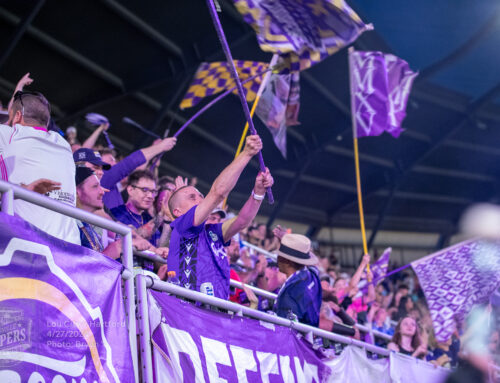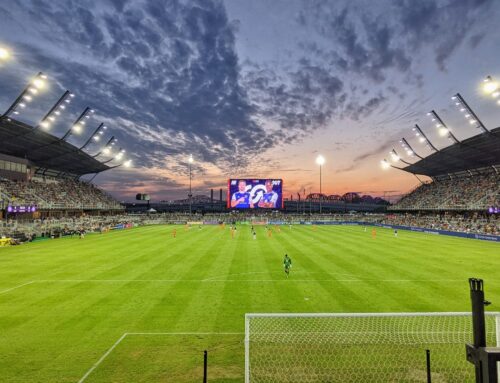Everybody welcome Carter Wright to the www.louisvillecoopers.com writing staff! He’s very good at this, and will probably put the editor out of a job soon. Read on!
Louisville City Football Club is still a very young organization, but with its imminent push for a new stadium, it’s already at a turning point.
As Coopers, we want City to play in a beautiful facility. We’ve done a remarkable job manufacturing energy and excitement in Slugger Field. But that’s not always easy to do in a building that is much better suited for its intended purpose: allowing people to spend a pleasant summer evening in seats oriented to a diamond-shaped field while consuming as much ice cream, hot dogs, and cold macrobeer as possible.
Putting aside the problems between LCFC and the Bats, the plain reality is that Slugger is not a very good place to watch soccer. We’ve been blessed with a team that has been managed and coached at a very high level from its inception. The team is compelling and likable, and it wins. But if the team stumbles in the standings, people aren’t going to come because of Slugger’s ambiance.
Buildings matter. We’ve seen how MLS didn’t get its legs as a league until teams were able to move out of overly bloated NFL stadiums and into soccer-specific facilities that match the human scale of North American soccer. Other clubs are building impressive new stadiums that make a physical statement that soccer is not weird anymore. You walk into those new buildings and you can feel that soccer is now a solid part of mainstream American culture. It’s no longer an argument. It is, literally, a concrete reality.
In the best cases, the geographic space of a stadium or arena entwines itself into the the history and culture of the team itself. Think of Anfield, Old Trafford, or Camp Nou. Or of Fenway or Wrigley. Or of the Garden — even James Dolan can’t deface that monument.
So, we want a new and gorgeous home for our City, a place we hope will become hallowed ground. But it’s a strange time to go about building a stadium.
Professional sports owners enjoyed a long, prosperous run convincing Americans that it makes perfect sense for taxpayers to pay for arenas and stadiums for their businesses and then hand most of the profits over to the owners. (Or, here in Louisville, to the local university’s athletic department.) The clock is now winding down on that game. Fewer and fewer voters are willing to keep paying for stadiums, especially in an era of when there are so many other parts of our infrastructure that need money for improvements.
Seattle taxpayers refused to let the NBA blackmail them to pay for a new arena, even though it meant watching their beloved Sonics get stripped away from them.
Elected officials in the Atlanta suburbs had to resort to blatant subversion of public disclosure laws to rush through a deal to build a new stadium for the Braves.
Even the mighty NFL is no longer able to count on taxpayer money: people in San Diego just voted by a landslide margin to reject a plan to use public money to help build a new stadium for the Chargers.
For soccer, broad approval for taxpayer-funded stadiums is no easier to find.
I’ve lost count of how many times DC United has watched a seemingly done deal for a new stadium collapse. It looks like they’re finally on their way out of RFK Stadium, but even now they still haven’t actually broken ground on their new facility.
Looking 262 miles to our west down I-64, the group trying to bring MLS to St. Louis risks touching off more public opposition through a dubious attempt to tie stadium funding to a badly-needed public transit expansion.
In Miami, even David Beckham doesn’t yet seem to have the juice to get a stadium built and a franchise awarded.
The wealthy owners of the NBA Cavaliers and Pistons are trying to exploit Detroit’s desperation for a new jail to get access to a choice piece of land downtown for a stadium for a new MLS franchise.
Overall, taxpayer funding for stadiums is getting so unpopular that President Obama proposed putting an end to the widespread practice of financing them with tax-free bonds.
All that said, it’s frustrating to us as LCFC supporters that so many other projects have gotten funding from city government but we’re now told that’s no longer an option. There are times when spending public dollars on cultural and recreational infrastructure can pay off for decades to come. Slugger Field cost $55.6 million in inflation-adjusted dollars and the city paid for most of it. The city just budgeted $8 million more of our money for a new scoreboard and other upgrades.
The Yum! Center’s sticker price was $261 million in inflation-adjusted dollars, but some by some estimates we actually still owe $350 million on the financing and bonds that were issued up by the city and state to build it.
The Omni hotel and luxury residences are going to cost taxpayers $139 million. I still haven’t heard a compelling argument for why a for-profit luxury hotel and resort company needed that level of subsidy. The deal was pushed through quickly, before much public discussion about it could happen.
LCFC’s stadium facility study sketched a range of budget scenarios, with costs ranging from $30 to $50 million and taxpayer contributions ranging from $15 to $27 million.
(To keep all of these outlays in perspective: here are examples of how much we’re spending per year on other basic services in the latest Louisville Metro budget: $178 million for police, $55 million for the fire department, and $19.5 for the libraries.)
While some members of Louisville Metro Council who say they’re open to putting at least some city money into a soccer stadium, the mayor’s support for public funding (specifically, anyway) has thus far been tepid.
It remains to be seen how the owners of LCFC plan to navigate this situation. Word on next steps, including a possible location, could come any day now.
As Coopers, I think we need to consider what role is best for us to play. While we’re advocating for the team and the sport, we need to keep in mind the growing backlash to taxpayer funding for stadiums that I outlined above.
We’re an independent supporters group. We should maintain our independent voice and not just be cheerleaders for a business that happens to operate a team that we root for on Saturday nights. It was heartening to see the Coopers help raise concerns about the team’s misguided plan to look at locations in Indiana.
Let’s see what locations are proposed. Let’s advocate for a site that adds to the social fabric of our city and helps it move confidently into the future. Let’s speak out for smart infrastructure around the stadium, like bike lanes and bus access to make it easier for working-class Louisvillians to get to games. Let’s lead calls for transparency and fairness as the process plays out.
Let’s do our part to help Louisville build a stadium that makes the people happy.













